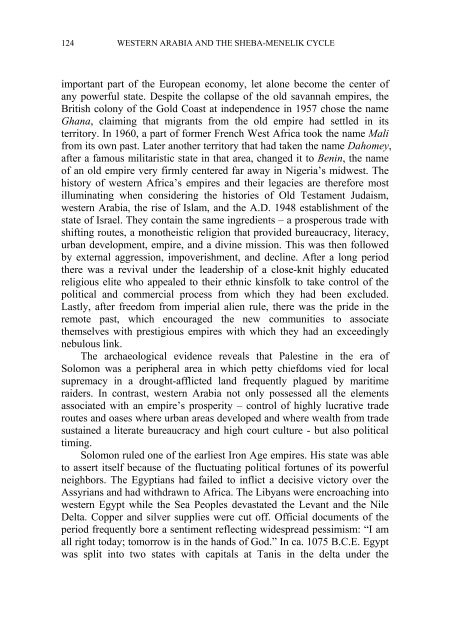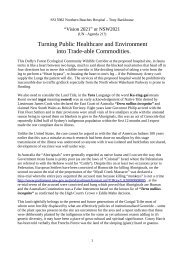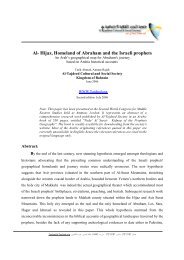Sheba
Sheba
Sheba
Create successful ePaper yourself
Turn your PDF publications into a flip-book with our unique Google optimized e-Paper software.
124<br />
WESTERN ARABIA AND THE SHEBA-MENELIK CYCLE<br />
important part of the European economy, let alone become the center of<br />
any powerful state. Despite the collapse of the old savannah empires, the<br />
British colony of the Gold Coast at independence in 1957 chose the name<br />
Ghana, claiming that migrants from the old empire had settled in its<br />
territory. In 1960, a part of former French West Africa took the name Mali<br />
from its own past. Later another territory that had taken the name Dahomey,<br />
after a famous militaristic state in that area, changed it to Benin, the name<br />
of an old empire very firmly centered far away in Nigeria’s midwest. The<br />
history of western Africa’s empires and their legacies are therefore most<br />
illuminating when considering the histories of Old Testament Judaism,<br />
western Arabia, the rise of Islam, and the A.D. 1948 establishment of the<br />
state of Israel. They contain the same ingredients – a prosperous trade with<br />
shifting routes, a monotheistic religion that provided bureaucracy, literacy,<br />
urban development, empire, and a divine mission. This was then followed<br />
by external aggression, impoverishment, and decline. After a long period<br />
there was a revival under the leadership of a close-knit highly educated<br />
religious elite who appealed to their ethnic kinsfolk to take control of the<br />
political and commercial process from which they had been excluded.<br />
Lastly, after freedom from imperial alien rule, there was the pride in the<br />
remote past, which encouraged the new communities to associate<br />
themselves with prestigious empires with which they had an exceedingly<br />
nebulous link.<br />
The archaeological evidence reveals that Palestine in the era of<br />
Solomon was a peripheral area in which petty chiefdoms vied for local<br />
supremacy in a drought-afflicted land frequently plagued by maritime<br />
raiders. In contrast, western Arabia not only possessed all the elements<br />
associated with an empire’s prosperity – control of highly lucrative trade<br />
routes and oases where urban areas developed and where wealth from trade<br />
sustained a literate bureaucracy and high court culture - but also political<br />
timing.<br />
Solomon ruled one of the earliest Iron Age empires. His state was able<br />
to assert itself because of the fluctuating political fortunes of its powerful<br />
neighbors. The Egyptians had failed to inflict a decisive victory over the<br />
Assyrians and had withdrawn to Africa. The Libyans were encroaching into<br />
western Egypt while the Sea Peoples devastated the Levant and the Nile<br />
Delta. Copper and silver supplies were cut off. Official documents of the<br />
period frequently bore a sentiment reflecting widespread pessimism: “I am<br />
all right today; tomorrow is in the hands of God.” In ca. 1075 B.C.E. Egypt<br />
was split into two states with capitals at Tanis in the delta under the




